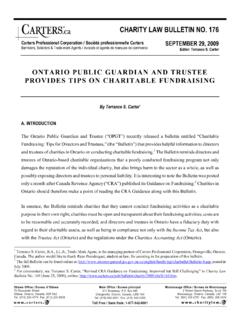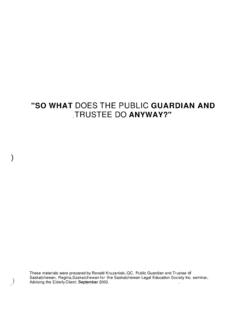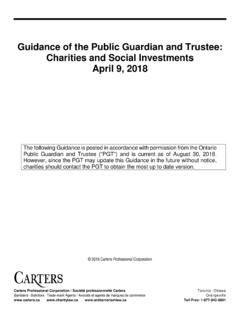Transcription of Planning for Children: The Public Guardian and Trustee of ...
1 INTERPLAY BETWEEN AGING, DEATH AND DIVORCE PAPER Planning for Children: The Public Guardian and Trustee of BC s Role in Guardianship Matters and the Protection of Minors Property Interests If you enjoyed this Practice Point, you can access all CLEBC course materials by subscribing to the Online Course Materials Library These materials were prepared by J. Cherisse Friesen, Legal Counsel, Child and Youth Services, Public Guardian and Trustee of BC, Vancouver, BC, for the Continuing Legal Education Society of British Columbia, March 2017. J. Cherisse Friesen Planning FOR CHILDREN: THE Public Guardian AND Trustee OF BC S ROLE IN GUARDIANSHIP MATTERS AND THE PROTECTION OF MINORS PROPERTY INTERESTS I.
2 Introduction .. 1 II. Guardianship Legislative Overview .. 2 III. The Powers of Guardians to Receive and Manage Minors Property .. 2 IV. The PGT as Trustee of a Minor s Property .. 3 A. Estate Funds Where no Trustee is Named .. 3 B. Life Insurance Proceeds .. 4 C. Proceeds from an RRSP or Pension Plan .. 5 D. Real Property .. 5 V. When the PGT Holds the Minor s Funds in Trust: The PGT s Use of the Child s Funds for Maintenance .. 6 VI. Applications to Appoint a Private Trustee under Section 179 of the Family Law 6 VII. Summary .. 9 I. Introduction In the absence of proper Planning , a minor s Guardian or prospective Guardian in British Columbia will likely have some dealings with the Public Guardian and Trustee of BC (the PGT ) in ensuring that the minor s property interests are protected.
3 The PGT may, for example, become a minor s property Guardian by default. Additionally, there are various instances where, by legislation, the PGT is appointed Trustee of a minor s property. The function of such legislative provisions is to ensure that a minor s property is protected, especially in the absence of a properly appointed successor Guardian or properly appointed Trustee . Children have property rights that are separate and distinct from those of their parents or guardians. With respect to property belonging to a minor, it is not uncommon for the parents or guardians of a minor to misunderstand what legal restrictions they have in the receipt and administration of their child s property.
4 Generally speaking, even in cases where the parents are presumptively the child s Guardian , they have restrictive authority to deal with a child s property. Additionally, when a Guardian steps into the role of a Trustee , he or she may not fully appreciate all of the duties and responsibilities that come with that role. This paper reviews circumstances in which the PGT will play a role in guardianship matters and in protecting a minor s property interests, either through her role as property Guardian or Trustee of minors funds. II. Guardianship Legislative Overview Guardianship is primarily governed by the Family Law Act, SBC 2001 ( FLA ).
5 Under section 39 of the FLA, parents are generally a child s guardians, although an agreement or an order can provide that a parent is not the minor s Guardian ( (2)). Otherwise, guardians may be appointed by the court ( ). Other types of guardians under the FLA are testamentary guardians ( ) and standby guardians ( ). Under the old Family Relations Act, , , terms such as Guardian of the person and Guardian of the estate were used and defined (section 25). The new legislation does not use those terms, but incorporates similar language in making a distinction between a Guardian of person and a Guardian of property. In certain circumstances, the PGT may become a child s property Guardian by default.
6 Under section 51(1) of the Infant s Act, the PGT is property Guardian of every minor who has no legal Guardian . This applies when the minor s Guardian has died without appointing a successor Guardian or when the Guardian refuses or is incompetent at law to act. This circumstance can arise, for example, when a minor s parents or guardians have died in a common accident, or if a sole Guardian has died, without leaving a successor Guardian . In those circumstances, by operation of section 51 of the Infants Act, the PGT is the minor s property Guardian and responsible for all of the minor s legal and financial affairs. In many cases, there are others, such as grandparents or other family members, who may wish to step in and act as the minor s Guardian .
7 Those prospective guardians must make a court application under s. 51 of the FLA, with notice to the PGT (see of the FLA). In making such an application, the proposed Guardian or guardians must be prepared to properly identify and protect the minor s legal and financial interests. The child may, for example, have a claim under the Family Compensation Act, RSBC 1996, c. 126 or may be a beneficiary of a deceased parent s estate. Additionally, the proposed guardians may have to address a potential wills variation claim on behalf of the child under the Wills Estates and Succession Act, SBC 2009 c. 13 ( WESA ). If the infant has such a claim, the Notice of Civil Claim must be filed within 180 days of the representation grant is issued to preserve the right of action.
8 In such circumstances, the prospective guardians must be prepared to advance the minor s viable legal claim and protect the minor s estate interests. Of note, applications for full guardianship (that is, guardianship of person and of property) may now be brought in either Provincial Court or Supreme Court. In the past, the Provincial Court did not have jurisdiction to grant an order for guardianship of estate (as defined under the former Family Relations Act). Section 193 of the FLA grants the Provincial Court jurisdiction over all matters, with the exception of those matters specifically excluded under that section. III. The Powers of Guardians to Receive and Manage Minors Property Under our legislative regime, guardians have restrictive authority to deal with a child s property, and there are few circumstances in which the guardians can receive and deal with a child s property without a court order or trust deed.
9 Section 176 of FLA confirms that, except as set out in section 178 of the FLA, a child s Guardian is not automatically a Trustee of the child s property. The exception set out in section 178 of the FLA speaks to the delivery of small property. Under section 178, a person having a duty to deliver property to a child may deliver the property either to the child (if the child has a duty to support another person) or to the Guardian who has parental responsibilities with respect to the child. However, property delivered pursuant to section 178 must not exceed the amount prescribed by the section 24 of the Regulations. At present, the prescribed amount is $10,000.
10 Additionally, there are certain circumstances where the property cannot be delivered pursuant to this section, such as when a Trustee has authority to receive or hold the property for the child or where the property is within a prescribed class of A Guardian holding funds under is a Trustee and subject to the Trustee Act, RSBC 1996 In order to receive the minor s property, the Guardian is prompted to acknowledge their duties and responsibilities as a Trustee of that property by completing a Form 3 (included in the FLA Regulations). In this Form, the Guardian acknowledges, among other things, that they hold the money in trust for the child, will keep the money separate from his or her money, will expend the money for the sole benefit of the child and will account to the child at age 19 and transfer the balance plus interest to the child at age 19.









